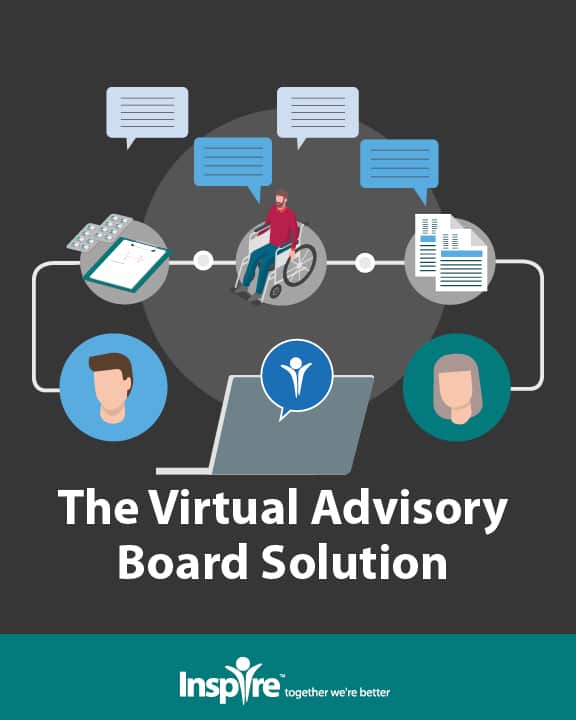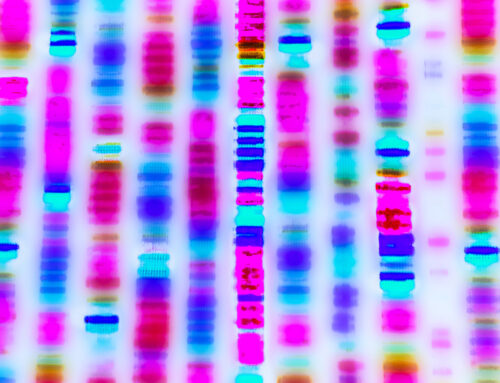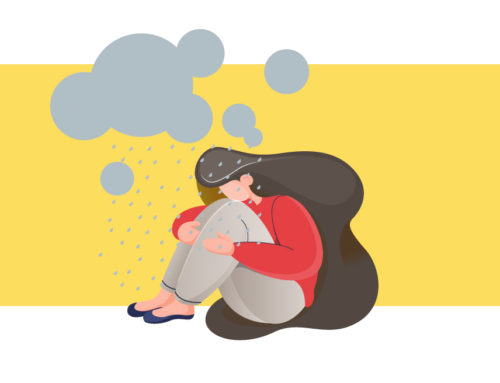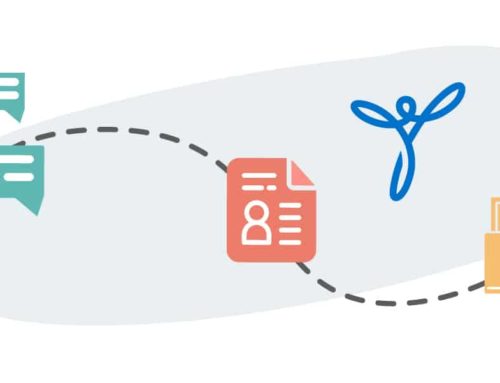Listen to People Impacted by Rare Disease
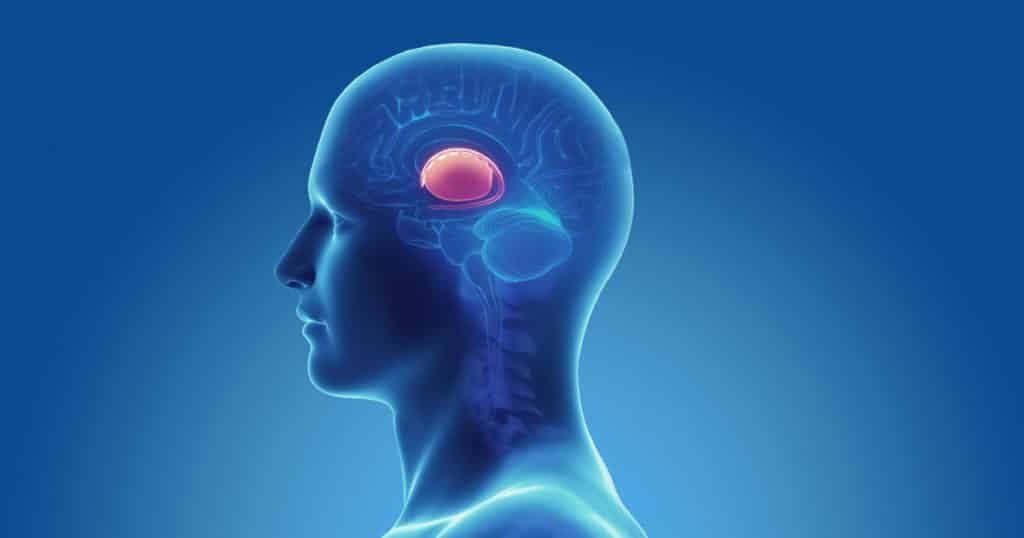
“The success (or failure) of the majority of rare disease drug development programmes rests on surrogate outcomes (e.g. laboratory measures, organ size) that may not reflect treatment benefits that patients value.”1 ~Morel and Canto
Thomas Morel and Stefan Canto’s position paper from 2017 clearly describes the dilemma faced in rare disease research. Lab measures and organ size don’t speak to what patients with rare diseases experience, need or value. This focus on measures that are not meaningful impacts the development of rare disease treatments and negatively affects approval and reimbursement of new treatments. They argue that outcomes for rare disease, because of the small numbers of patients and age of many sufferers (children) necessitate listening to patients and caregivers, and then developing measures.1
Now, access to rare disease patients and caregivers is facilitated by the connectivity of the Internet. Organizations, like Global Genes, are also part of the answer. The largest gathering of rare disease patients, caregivers, advocates, opinion leaders and authorities are meeting in Irvine, on California Oct 3-4 at the Global Genes Rare Patient Advocacy Summit.
Seth Rotberg will be a presenter at the conference. Rotberg wears many hats: he will be speaking at the Summit as a Huntington Disease (HD) advocate and Board Member of the Huntington’s Disease Youth Organization but he also works at Inspire as the Partnerships Manager. As Partnerships Manager he arranges free, online communities for qualified 501(c)(3) nonprofit patient advocacy organizations on Inspire.
Getting to diagnosis with a rare disease
Inspire members often describe the hardship they and their loved ones endure in their quest for a diagnosis. Without a diagnosis, they experience disbelief and they question themselves and their reality. Their loved ones don’t know what is happening and what to believe.
Rotberg’s exuberance and youthful charm belies the ordeal wrought by HD as he grew up in a suburb of Boston. Since 2014, he has been publicly sharing his personal journey.
“When I was about 12, I started noticing something wrong with my mom. She wobbled from poor balance, often tripping and falling over, as if she were drunk. She had severe mood swings; one minute she was fine and the next, she was angry, frustrated, or depressed,” he wrote in a post for Capturing the Corners.3
His mother would “start yelling at me. And she was always feeling depressed and wanted to sleep all day.” Multiple physicians’ visits resulted in a diagnosis of bipolar disorder and major depression, but Rotberg’s family knew there was something else going on.
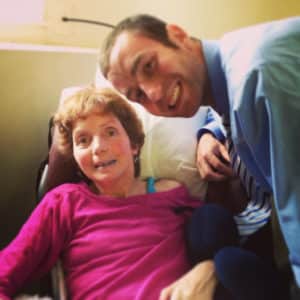
Sadly, treatments for these disorders had no effect. Rotberg’s older sister left for college when he was fourteen. This change increased the stress: “I think my sister leaving for college didn’t help the situation, but we just didn’t have the answers to my mom’s behaviors which caused constant stress at home,” he said. “There were nights that I would stay at my friend’s house because I needed a break from my family life.”
His father considered taking Rotberg and leaving his mother alone to care for herself, but “right before he reached his final breaking point, our family (plus my mom’s brother and sister-in-law) decided to schedule an intervention…. We sat my mom down and let her know that she needed help. With a firm tone, we told her that we were checking her into a mental facility to be examined, and that she would not get to have a say in our decision.”3 Lacking an adequate diagnosis, his mother was “becoming a different person more and more everyday,” Rotberg explains.
Reflecting on the trauma, Rotberg said, “It was difficult for me to imagine myself in her shoes: Having the ones you loved and trusted more than anything in the world demand that you be submitted into [sic: admitted to] a mental facility against your own will. Needless to say, my mom was not happy at all. In fact, she was furious.”4
The family dynamics behind the intervention were not lost on Rotberg. “I was fully aware of the role I played in her predicament.” Protecting him motivated his father’s, aunt’s and uncle’s actions. “I…couldn’t fight the sinking feeling of guilt…every time I went for a visit….I couldn’t help feeling that she shouldn’t have been in there.”3
This traumatic low point in his mother’s diagnosis journey could have ended in tragedy if not for the foresight of the physicians at the mental health facility who did a variety of different tests and finally discovered his mother had Huntington’s Disease.
Huntington’s Disease (HD)
“Not only does the disease impact the person with it but it affects those around them, like myself who have to deal with it everyday,” Rotberg explained.
Discovered and mapped to chromosome 4 in 1983, the IT15 gene that causes HD is changed by the repetition of the CAG (cytosine, adenine, guanine) codon in the DNA that codes for the protein huntingtin. People who have CAG repeats of 35 or more are more likely to develop HD and to pass on this change through their egg or sperm to offspring. Research has shown that the greater the number of CAG repeats, the earlier the age of onset of HD.4
The huntingtin protein plays a pivotal role in nerve cell function. For people with HD, the altered huntingtin protein does not fold but forms tangled rigid protein aggregates that interfere with nerve cell function.
Although it is a hereditary disorder, it can occur spontaneously in people. This seems to have been the case for Rotberg’s mother. No one in his family, until his mother, had manifested the disease.
Rotberg’s parents explained the HD diagnosis as soon as they had it, but at 15, Rotberg said, “I didn’t really understand the severity of the disease, and in the natural sense of denial that fear brings, I convinced myself I didn’t really care too much, either.” Like most teens, Rotberg wanted to be “normal.” “I’d be embarrassed to be around with my mom because of the slurred speech and wobbly movements…I took it out on friends and family because I knew my life was going to be different from here on out. I officially lost out on a normal life and a normal mom and I couldn’t wait to go to college and get away from my mom and the HD.”5
Global Genes Summit Presentation
People react differently to a rare disease diagnosis. Rotberg, along with Allison Fine, MSW, LICSW, Executive Director of the Center for Chronic Illness, a Seattle nonprofit, will be exploring the emotional health and journey of rare disease patients in their co-presentation at the upcoming Global Genes summit. Rotberg will share his experience as a caregiver and child of someone with HD. He will also discuss HD as an inherited disorder.
It was only when Rotberg left for college at the University of Massachusetts-Amherst that he began to research HD. He found out that once a person starts ‘showing symptoms of HD, the average lifespan was 10 to 20 years.” He realized, “My mom’s clock was slowly ticking down before I knew it.” He also came to understand that “when my mom was acting differently, it was not her fault, it was the HD that was causing my family stress.” To alleviate the guilt he had for the way he had treated her, he began raising money for and awareness of HD.
He also discovered that HD is inheritable and, in fact, is autosomal dominant, meaning he had a 50/50 chance of inheriting the disease. Dogged by the knowledge that with a “flip of a coin” he could have HD, he became sensitive to any change in his behavior. Rotberg said, “I would trip over something or drop a cup and immediately think, ‘that has to be the HD.’ Sometimes if I was slow to react to what my friends were saying…they would say, ‘dude are you drunk, can’t you hold your liquor?’…These little things reminded me of my mom.”2
To Test or Not to Test
Since 1993, a test to learn if you have the HD allele has been available to people whose family members are affected. Having the ability to test doesn’t necessarily mean that people who are at risk will do so. Rotberg notes, “Deciding whether or not to go through genetic testing is one of the toughest decisions a person has to face. And as a young person you have to decide: Do I want to live with the unknown or do I want to find out and think through the impact on my future?”6
During his sophomore, in March 2011 when he was 20 years old, Rotberg got tested for the disease he describes as “having ALS, Alzheimer’s and Parkinson’s Disease all at the same time.” He does not recommend the process that he took, “I went through my primary care provider and got a referral to a neurologist. Although the neurologist was knowledgeable about HD, I didn’t go through the protocol that is typical in genetic testing. Normally, you would talk with a genetic counselor for a while before testing to make sure you’re prepared for your results and have the right support in place.” Instead of sending Rotberg directly to a genetic counselor, the neurologist just ordered the test. Only when Rotberg came for the results was a genetic counselor in the room.
“Seth, your test results came back positive for Huntington’s Disease,” Rotberg remembered the neurologist said. Hearing these words, Rotberg said, “I blocked out everything the neurologist had to say…because I knew I was destined to slowly deteriorate, both physically and mentally, just like my mom.”2 He kept his diagnosis a secret from his parents, sister and extended family for three years.
When Rotberg told his father and sister of his diagnosis, their response surprised him. Rotberg remembered in his TEDx presentation that his father just said, “’Okay.’ I was in disbelief: ‘That’s it?’ I said. He explained that he was not worried based on all the research happening. He said it is important to stay positive because, soon enough, there will be a cure for it.”1
Rotberg’s mother died in March 2015. She spent her last five years in a nursing home and never learned of her son’s diagnosis.
Activism
Rotberg has been an activist, raising money and awareness for HD. He works with young people dealing with HD, as children, caregivers and potential HD patients. He’s been awarded the HDSA Youth of the Year award, and in 2016 received the Heroes Among Us Award from the Boston Celtics. He has also made presentations at Northwestern University, TEDx -Natick, among others. Most of his presentation at the Global Genes Patient Advocacy Summit will focus on his own patient experience.
Rotberg knows the experience of rare disease, not only as a family member and caregiver but also as a patient. Like others who live with rare disease, he has intimate, valuable and scarce knowledge that researchers do not have.
In their position paper, Morel and Canto state, “…a rare disease affects every aspect of … daily life, patients and their caregivers become experts of the rare condition and of the important outcomes of diseases that need to be addressed. It is thus critically important to partner with and listen to them.” Morel and Canto recommend an integrated, mixed methods approach involving quantitative, but more importantly, qualitative listening to patients and others affected by the rare disease to effectively create meaningful health outcomes measures.1
Rotberg’s work as an activist has motivated his career; currently his work at Inspire aims to not only connect patients and caregivers in the rare disease community with each other but also make rare disease research more valuable to them by learning which outcomes are most important to them.
“Live as if you were to die tomorrow. Learn as if you would live forever.”
Tattooed across his back, these words have been the driving force in Rotberg’s life since his diagnosis. It’s not been easy, but Rotberg, his family and the HD community believe there will be a cure. More than anything, he wants others who are experiencing rare disease to be heard and to feel the same certainty that a cure awaits their conditions.
Inspire offers a trusted community to patients and caregivers. Our goal with this blog, this website and our content is to provide the life science industry access to the true, authentic patient voice. In so doing, we support faithful operationalization of patient-centricity. Take a look at our case studies, eBooks and news outlet coverage.
Reference:
1 Morel, T & Cano, S.(2017). Measuring what matters to rare disease patients – reflections on the work by the IRDiRC taskforce on patient-centered outcome measures. Orphanet Journal of Rare Diseases 12(171). https://doi.org/10.1186/s13023-017-0718-x
2 Rotberg, S. (2018, March) Navigating Genetic Disease Testing: A Personal Story” TEDxNatick. [Video file]. Retrieved from https://youtu.be/5_O5TfMVqD8
3 http://capturingthecorners.org/2016/10/16/my-huntingtons-disease-story/
4 HOPES: Huntington’s Outreach Project for Education at Stanford, http://web.stanford.edu/group/hopes/cgi-bin/hopes_test/population-genetics-and-hd/
5 Rotberg, S. (2017, November). Northwestern University HD Symposium. [Video file]. Retrieved from https://www.youtube.com/watch?v=XmSsNA9XWU0
6 http://www.caringvoice.org/qa-testing-for-huntingtons-disease/

